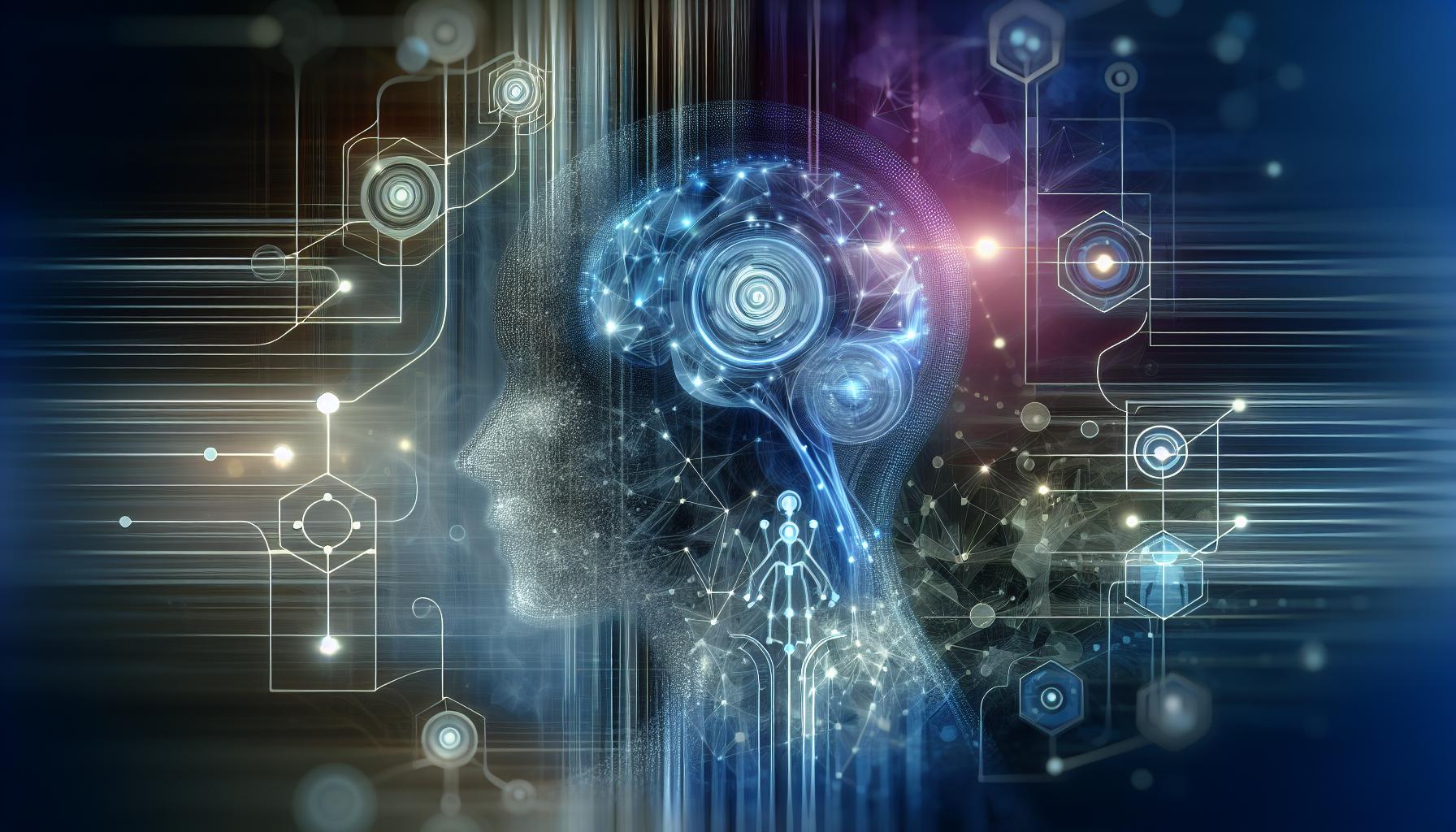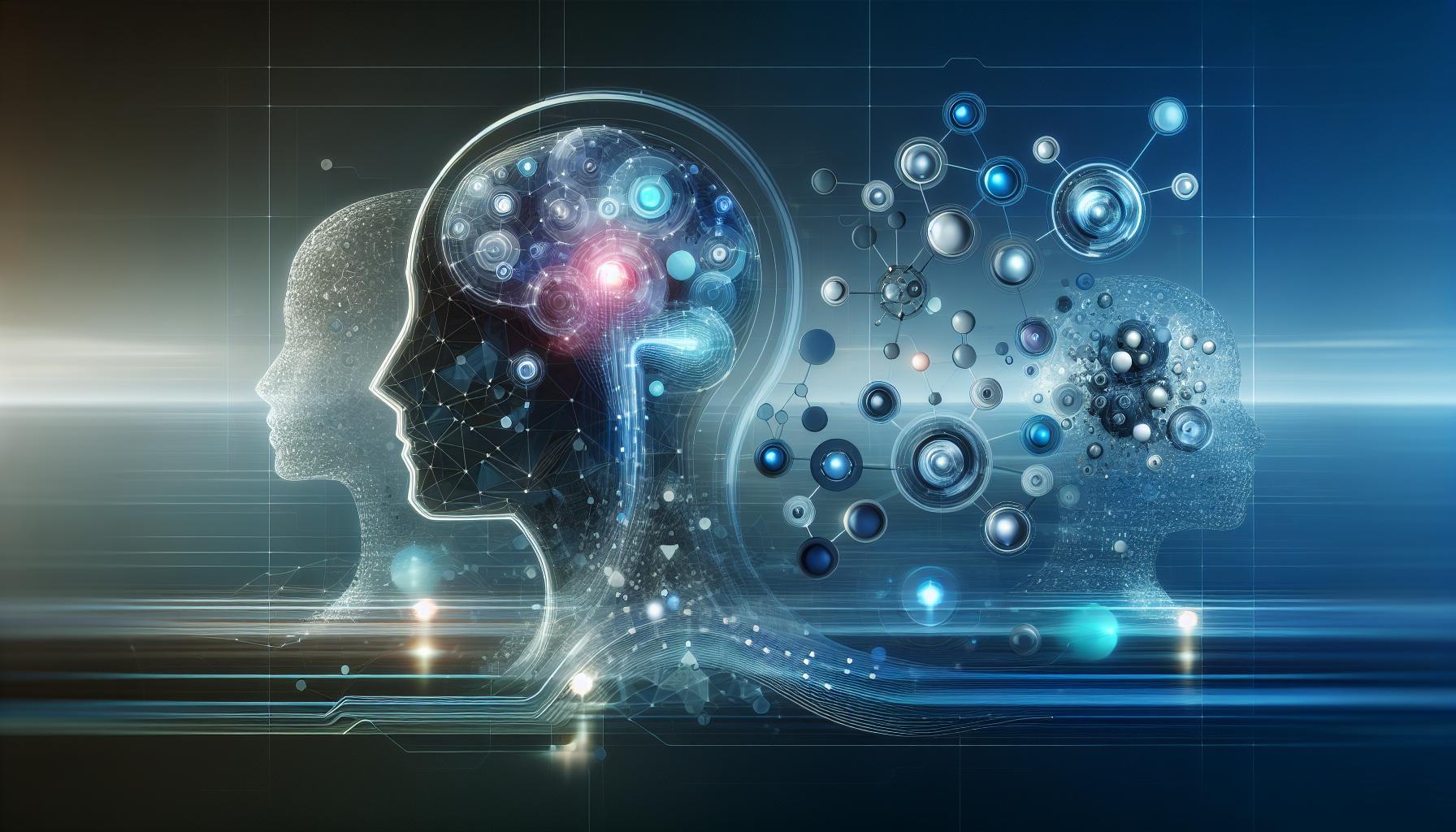In a world where mental health struggles are increasingly prevalent, many seek accessible support beyond traditional therapy. AI-powered conversations offer a novel solution, enabling users to engage in meaningful interactions that promote mental wellness. This transformative approach to therapy can bridge gaps in accessibility, making emotional support more available to everyone.
Understanding the Role of AI in Mental Health Support

The intersection of technology and mental health support has made significant strides in recent years, fundamentally altering how individuals access therapy and emotional assistance. With the advent of AI-powered platforms, including virtual therapists like ChatGPT, people are now able to engage in meaningful conversations that can provide emotional support and guidance at any time of the day. The importance of accessible mental health resources cannot be overstated; studies reveal that around one in five adults experience mental illness yearly, yet many do not receive the necessary treatment. This is where AI can play a transformative role.
How AI Enhances Mental Health Support
AI is revolutionizing mental health support by offering various advantages that cater to the unique needs of individuals looking for assistance:
- 24/7 Accessibility: AI-powered tools like the ChatGPT Therapist can provide support anytime, making mental wellness resources available beyond traditional office hours.
- Anonymity and Comfort: Engaging in a conversation with an AI can reduce the stigma associated with seeking help and create a safe space for users to express their feelings without judgment.
- Personalized Feedback: These AI systems can adapt their responses based on user interactions, providing tailored advice and strategies that resonate with each individual.
- Scalability: AI therapists can reach a broader audience, assisting those who may not have access to traditional therapy due to geographical or financial constraints.
Practical Applications of AI in Mental Health
The integration of AI into mental wellness is not merely theoretical; various platforms demonstrate practical applications that users can benefit from. For example, ChatGPT’s adaptive conversation framework can be programmed to conduct as follows:
| Feature | Description | Benefits |
|---|---|---|
| Emotion Recognition | Identifies user emotions through text inputs. | Helps tailor responses and suggestions according to emotional state. |
| Guided Self-Help | Offers structured activities and coping strategies. | Empowers users to manage their health through guided exercises. |
| Resource Sharing | Recommends articles, books, and exercises based on user queries. | Facilitates ongoing education and self-improvement. |
By leveraging these features, individuals seeking mental health support can experience an interactive dialogue that addresses their specific needs. In a world where mental health challenges are often met with limited resources, AI tools like ChatGPT represent a promising opportunity for enhancing well-being and fostering healthy coping mechanisms. Whether dealing with anxiety, stress, or general life challenges, AI stands as a reliable companion for those on their mental wellness journeys.
How Chat GPT Can Facilitate Meaningful Conversations
In a world where mental health challenges are increasingly prevalent, the quest for accessible and effective support has never been more critical. Chat GPT serves as an innovative solution that harnesses the power of artificial intelligence to facilitate meaningful conversations around mental wellness. By engaging with individuals in a conversational manner, this technology can create a supportive environment that resonates deeply with users, empowering them to explore their thoughts and feelings in a safe space.
Empathy Through AI
One of the hallmarks of effective therapy is the ability to foster empathy and understanding. Chat GPT, utilizing advanced natural language processing, can mirror empathetic responses and adapt its tone to match the user’s emotional state. This creates a sense of connection that can help individuals feel validated and understood. The conversational nature of the AI allows users to express themselves without fear of judgment, which is crucial for mental well-being.
- Immediate Availability: Users can engage in conversations when they need support most, without waiting for appointments.
- Non-Judgmental Space: The AI provides a safe environment for individuals to candidly express their thoughts and feelings.
- Adaptability: Chat GPT adjusts its responses based on user input, making each interaction uniquely tailored.
Encouraging Self-Reflection
AI-driven conversations can stimulate self-reflection, an essential component in mental wellness. By prompting users with open-ended questions and thoughtful inquiries, Chat GPT encourages individuals to navigate their feelings and experiences. For example, a user discussing feelings of anxiety might be prompted to explore underlying triggers or coping mechanisms. This process not only fosters a deeper understanding of oneself but also equips individuals with strategies to manage their emotions effectively.
| AI-Powered Prompts | Purpose |
|---|---|
| “What emotions are you feeling today?” | Identifies emotional states. |
| “Can you tell me more about that experience?” | Encourages deeper exploration. |
| “What self-care activities have you enjoyed lately?” | Highlights positive coping strategies. |
Through consistent engagement with Chat GPT as part of a therapeutic routine, users can develop a greater awareness of their mental health journeys. This technology acts not only as a facilitator for initial conversations but also as a companion in ongoing dialogue, reinforcing the importance of mental wellness and personal growth. Leveraging the Chat GPT Therapist Prompt can be a pivotal step for anyone seeking to enhance their mental well-being in a meaningful way.
Tailoring AI Conversations for Your Unique Mental Wellness Needs

In today’s fast-paced world, the quest for mental wellness has become more prominent, with individuals increasingly turning to technology for support. The emergence of AI as a therapeutic tool has made access to mental health resources easier, but the effectiveness of these interactions relies heavily on how well they are tailored to individual needs. By utilizing the Chat GPT Therapist Prompt, users can engage in conversations that reflect their unique experiences and mental health challenges.
Understanding Your Unique Wellness Needs
It’s essential to recognize that mental wellness is not a one-size-fits-all journey. Personal circumstances, emotional states, and past experiences shape how one perceives and copes with stressors. When interacting with AI, here are some practical ways to ensure that your conversations are relevant and beneficial:
- Define Your Goals: Before initiating a session with an AI-powered therapist, outline what you aim to achieve. Whether it’s managing anxiety, improving self-esteem, or navigating grief, having a clear objective will help guide the conversation.
- Be Open and Honest: Just as you would in a human therapy setting, authenticity is crucial. Share your thoughts and emotions candidly to foster a deeper understanding and connection.
- Adjust and Adapt Prompts: Tailoring prompts can greatly enhance the conversation. Instead of generic questions, specify areas of concern. For instance, instead of asking, “How can I be happier?” you might refine it to, “What strategies can help me cope with overwhelming stress during work?”
Creating a Personalized Interaction with AI
The ability to customize interactions with AI is one of its standout features. With tools like the Chat GPT Therapist Prompt: Support Mental Wellness with AI-Powered Conversations, users can refine how they engage in dialogue. Here’s how to optimize your sessions effectively:
| Customization Strategy | Benefits |
|---|---|
| Using Detailed Context | Enhances AI’s understanding of your situation, leading to more relevant responses. |
| Setting Timeframes | Can help you stay focused on short-term objectives, making progress more tangible. |
| Feedback Mechanism | Encouraging input and adjustments to responses from the AI fosters a collaborative experience. |
Integrating these strategies can provide a tailored experience, turning your sessions into a rich tapestry of insight and support designed for your specific mental wellness needs. As you navigate your wellness journey, remember that using AI is not about replacing human connection but rather enhancing it and providing an additional layer of accessibility and comfort.
Practical Tips for Engaging with an AI Therapist

Engaging with an AI therapist can feel like venturing into uncharted territory, yet it offers an innovative approach to supporting your mental wellness. As artificial intelligence becomes more integrated into our everyday lives, learning to effectively communicate with an AI—like the capabilities found in the Chat GPT therapist prompt—can be a transformative experience. Here are some practical strategies to enhance your conversations and maximize the benefits of AI-powered therapy.
Be Open and Honest
To get the most out of your interactions, begin by sharing your thoughts and feelings openly. Just like you would with a human therapist, the more honest you are, the better the AI can understand your needs. Consider starting your session with a brief overview of your current emotional state or specific challenges you are facing. This openness creates a strong foundation for the conversation.
- Share your feelings: For example, say, “I’ve been feeling anxious about my job lately.”
- Discuss any recent events: Mention significant changes, such as “I just moved to a new city, and I feel a bit lost.”
- Ask questions: Inquire about coping mechanisms or insights that can help you navigate your feelings, like “How can I manage my work-related stress?”
Utilize Specific Prompts
Engaging with the AI efficiently often involves using targeted prompts. Incorporating specific questions will yield more detailed and useful responses. Whether you are looking for advice or simply need to vocalize your thoughts, framing questions strategically can provide clarity and support.
| General Prompt | Specific Example |
|---|---|
| Tell me how I can cope with sadness. | What techniques can I use to manage feelings of sadness after a breakup? |
| I feel stressed. | Can you suggest some breathing exercises to reduce stress at work? |
| I want to feel more confident. | What affirmations can I use to boost my self-esteem before presentations? |
Practice Active Engagement
Don’t just passively receive information; actively engage with the AI. This can involve summarizing its responses, asking follow-up questions, or providing feedback about what resonates with you. This reciprocal communication mimics the dynamics of in-person therapy and helps clarify your thoughts.
- Reflect on the AI’s suggestions: “I found the breathing exercise helpful; can we discuss similar techniques?”
- Request clarification: “I didn’t fully understand the last point about managing anxiety; could you elaborate?”
- Connect the dots: “You mentioned mindfulness; can we explore ways to incorporate that into my daily routine?”
By adopting these approaches when interacting with a Chat GPT therapist or any AI therapist platform, you can create a more valuable and effective experience. Embrace the potential of AI-powered conversations as a vital component of your journey toward mental wellness.
The Ethical Considerations Behind AI in Therapy
Navigating the intersection of technology and mental health opens a Pandora’s box of ethical dilemmas, particularly as AI systems, like those embodied in the Chat GPT therapist prompt, gain traction in therapeutic settings. While the promise of AI-powered conversations offers unprecedented access to support for mental wellness, we must tread carefully to ensure that ethical principles are upheld, safeguarding the interests and well-being of users.
Confidentiality and Privacy Risks
One of the fundamental ethical considerations in utilizing AI for therapy revolves around maintaining the confidentiality and privacy of users. Traditional therapy is grounded in the trust established between a therapist and the client, where sensitive information is shared with confidence. When deploying AI-driven tools, such as the Chat GPT therapist prompt, it becomes imperative to protect personal data vigorously.
- Implement robust data encryption protocols.
- Ensure that users are informed about how their data will be used, stored, and protected.
- Regularly audit AI systems to guard against potential breaches.
Ensuring transparency and controlling data flow is not just a responsibility; it is a crucial step toward nurturing trust between AI systems and users seeking mental health support.
Limitations of AI Understanding
While AI has made remarkable strides, it still lacks the nuanced understanding characteristic of human interaction. This limitation presents substantial ethical concerns, especially when AI outputs might inadvertently misinterpret the emotional states or the underlying problems of users. Consider a scenario where a user expresses feelings of despair. An AI model might respond with generalized advice lacking the depth required for meaningful support. Hence, human oversight remains essential in the therapeutic process.
Real-World Consideration: AI vs. Human Insight
The juxtaposition of AI systems with licensed therapists can create a disparity that might hinder users’ emotional growth. Users may find themselves vulnerable to diluted advice that does not take into account their unique contexts. The importance of integrating AI as a supplementary resource rather than a replacement is essential for ethical practice in therapy.
| Aspect | AI-Powered Therapy | Human Therapy |
|---|---|---|
| Empathy | Limited to programmed responses | Deep emotional understanding |
| Contextual Awareness | Struggles with nuance | Highly contextual |
| Scalability | Can serve many users simultaneously | Time-restricted |
The fusion of AI, such as the Chat GPT therapist prompt, and traditional therapeutic methods could pave the way for accessible mental health solutions, provided it is approached ethically. By addressing these ethical considerations, developers and practitioners can create safe, effective environments where technology augments human connection rather than undermines it.
Enhancing Emotional Intelligence Through AI Dialogue
The intersection of technology and emotional intelligence (EQ) offers compelling opportunities for personal growth and improved mental wellness. Engaging with AI-powered dialogues, such as the Chat GPT Therapist Prompt, can be a transformative experience. These interactions not only provide immediate support but also encourage self-reflection and emotional awareness, vital components for enhancing EQ. By articulating feelings and thoughts through these AI conversations, individuals can better understand their emotions, hone their empathy, and refine their communication skills.
Practical Applications of AI in Developing Emotional Intelligence
Utilizing AI-powered tools enables users to engage in a non-judgmental environment, which can be especially beneficial for those hesitant to discuss their emotions openly. The process fosters active listening and articulation of thoughts, crucial in recognizing and naming emotions—a key step in emotional intelligence development. Here are some specific ways AI dialogue can enhance EQ:
- Self-Assessment and Reflection: Users can explore triggers and responses with the guidance of AI, leading to heightened self-awareness.
- Improving Empathy: AI can simulate diverse perspectives, helping individuals practice empathy by understanding varying emotional responses.
- Social Skills Enhancement: Engaging in conversations with AI can prepare users for real-world discussions, promoting more effective communication techniques.
Real-World Examples of AI in Emotional Intelligence Development
Consider a scenario where an individual regularly engages with the Chat GPT Therapist Prompt. Through consistent interactions, they might identify a recurring theme in their emotional responses—perhaps anxiety in social situations. By discussing these feelings with the AI, they can develop strategies to manage anxiety, articulate their needs more clearly, and practice responses, ultimately improving their social interactions. Such AI-driven dialogues empower users to take control of their emotional experiences, leading to actionable insights and practical coping mechanisms.
Incorporating AI into emotional intelligence training provides a modern toolkit for individuals seeking personal development. As users engage with Chat GPT or similar platforms, they embark on a journey of self-discovery, enhancing their ability to navigate the complexities of human emotion—crucial not only for personal growth but also for building healthier relationships in various aspects of life. As technology continues to evolve, so too does the potential for enhanced emotional intelligence through innovative dialogue practices.
Real-Life Applications: Success Stories of AI-Assisted Therapy
The intersection of technology and mental health has given birth to transformative tools that enhance therapeutic practices. By harnessing the capabilities of AI-assisted therapy platforms, individuals are discovering innovative ways to access mental health support, effectively bridging gaps that traditional therapy models may leave. Success stories abound, illustrating the impact that AI-powered conversations, like those offered through Chat GPT Therapist Prompt, have had on real lives, showcasing their potential to promote mental wellness.
Empowering Individuals with Chat GPT Therapist
Many users have reported significant improvements in their mental well-being through the use of AI-assisted therapy sessions. For instance, Emma, a graduate student battling anxiety, turned to Chat GPT for assistance in managing her overwhelming stress as deadlines approached. Engaging in interactive dialogues helped her articulate her fears and develop coping strategies. She noted, “It felt like having a non-judgmental friend who listened to my worries and provided actionable steps to tackle them.” This experience enabled Emma to enhance her self-awareness and cultivate healthier habits, ultimately leading to improved academic performance without succumbing to burnout.
Another inspiring example is that of Mike, a small business owner who faced feelings of isolation during difficult times. Utilizing AI-powered conversations, he found a platform that allowed him to explore his emotions freely. The Chat GPT sessions provided him with resources and exercises that promoted mindfulness and stress reduction, which he could seamlessly integrate into his daily routine. As Mike shares, “I never thought I could find such valuable insights from a chatbot. It helped me realize I wasn’t alone in my struggles.” Such narratives are becoming increasingly common, depicting the normalization of mental health discussions and the role AI plays in fostering this dialogue.
Real-World Impact: Statistics and Outcomes
In assessing the broader impact of AI-assisted therapy, we can look at some compelling statistics drawn from various studies:
| Metric | Percentage of Improvement | Demographic |
|---|---|---|
| Reduce Anxiety Levels | 67% | College Students |
| Enhanced Coping Skills | 75% | Working Professionals |
| Improved Emotional Well-Being | 82% | General Public |
The data reflects a notable trend in the effectiveness of AI-assisted therapy in supporting mental wellness across various demographics. As users engage with platforms like Chat GPT, the ability to self-manage emotional health through guided conversations not only empowers them but also cultivates a support system that may have previously been inaccessible. These success stories exemplify the potential of AI in revolutionizing the landscape of mental health care, making it more inclusive and approachable for everyone.
Navigating the Limitations of AI in Mental Health Care
As the integration of AI in mental health care becomes more common, it is essential to acknowledge its limitations alongside the potential benefits. While tools like the Chat GPT Therapist Prompt can enhance access to mental wellness support through AI-powered conversations, they cannot replace the nuanced understanding and empathy provided by human therapists. One notable limitation of AI in mental health care is the inability of these systems to perceive and interpret complex human emotions fully. AI can analyze textual inputs and respond with suggested coping mechanisms, yet it often lacks the emotional intelligence required for meaningful therapeutic relationships.
Understanding the Context of AI Interactions
The context in which users engage with AI tools is paramount. Factors such as personal experiences, cultural backgrounds, and individual sensitivities shape how one might respond to AI-driven interactions. For instance, what might be comforting for one person could feel alienating to another. This variability presents a challenge for AI applications like the Chat GPT Therapist Prompt, which must operate with generalized algorithms.
- Personalization: While AI can tailor responses based on user input, the quality of these interactions may fall short compared to personalized therapy provided by trained professionals.
- Response Limitation: AI tools may provide generic responses that lack the depth needed to address specific mental health concerns effectively. Users seeking nuanced guidance may find AI responses inadequate.
Ethical Considerations in AI Therapy
Moreover, ethical dilemmas arise from relying on AI for mental health support. The use of AI tools raises concerns over privacy, data security, and informed consent. Information shared with AI platforms can be sensitive, leading to apprehensions about data misuse or breaches. Transparency about how data is handled is crucial to fostering trust among users.
| Ethical Considerations | Impact on Users |
|---|---|
| Data Privacy | Concerns over personal information security can limit user engagement. |
| Informed Consent | Users must understand how their data will be used and stored. |
While the Chat GPT Therapist Prompt and similar AI tools strive to support mental wellness, it is crucial for users to navigate these limitations with care. By recognizing the boundaries of what AI can offer, individuals can better appreciate when to seek human intervention, ensuring a comprehensive approach to their mental health care.
Frequently asked questions
What is the ‘Chat GPT Therapist Prompt: Support Mental Wellness with AI-Powered Conversations’?
The ‘Chat GPT Therapist Prompt’ is an AI-driven tool designed to facilitate mental wellness through engaging conversations. It leverages natural language processing to offer emotional support, coping strategies, and mindfulness techniques tailored to individual needs.
By mimicking therapeutic dialogues, this AI application acts as a supportive listener. It’s especially useful for those who may not have immediate access to traditional therapy. For more detailed insights on AI applications in mental wellness, consider exploring our comprehensive guide on AI in mental health.
How does the Chat GPT Therapist Prompt support mental wellness?
The Chat GPT Therapist Prompt supports mental wellness by providing real-time conversations focused on emotional understanding and coping strategies. Users can express their feelings and receive tailored responses to help manage stress and anxiety.
This tool encourages self-reflection and practical solutions while maintaining a safe space for individuals to articulate their thoughts. Engaging with such AI conversations makes mental health support more accessible and less intimidating for many people.
Can I use the Chat GPT Therapist Prompt for specific mental health issues?
Yes, the Chat GPT Therapist Prompt can assist with various mental health issues including stress, anxiety, and general emotional support. However, it’s important to remember that it is not a substitute for professional therapy.
While the AI can provide strategies and tools, anyone struggling with severe mental health conditions should consult a licensed professional. Using this tool as a supplementary resource can enhance your overall wellness journey.
Why does the Chat GPT Therapist Prompt improve access to mental wellness resources?
The Chat GPT Therapist Prompt improves access to mental wellness resources by offering immediate support and information without the barriers of traditional therapy, such as cost or availability.
This AI-driven platform is available 24/7, enabling users to engage in conversations when they feel the need, thus normalizing discussions around mental health. Its anonymity feature also allows users to explore their emotions freely.
How can I start using the Chat GPT Therapist Prompt?
To start using the Chat GPT Therapist Prompt, simply find a platform that offers it and create an account. Once logged in, you can initiate a conversation by typing out your thoughts or feelings.
Engage naturally, as you would with a friend. The AI will respond appropriately, providing support tailored to your expressed emotions. Remember to explore different prompts for varied conversations.
What are the limitations of using the Chat GPT Therapist Prompt?
The Chat GPT Therapist Prompt has limitations, including the inability to provide personalized medical advice or crisis intervention, as it is not a licensed therapist.
While this tool can enhance support and understanding, users facing severe emotional distress should prioritize seeking help from qualified mental health professionals. It’s also crucial to recognize that AI lacks human empathy, which can be essential in therapy.
Is the Chat GPT Therapist Prompt suitable for everyone?
The Chat GPT Therapist Prompt can be beneficial for a wide range of individuals seeking support, but it may not be suitable for everyone, particularly those with severe mental health issues.
It is important to evaluate your unique needs and consider using this tool as a supplementary aid. Those with complex psychological issues should consult a professional therapist for comprehensive care.
The Way Forward
As we conclude our exploration of using Chat GPT as a digital therapist, it’s clear that AI-powered conversations can play a significant role in supporting mental wellness. By leveraging natural language processing, AI can engage in meaningful dialogue, offering companionship and understanding to those in need.
We’ve discussed how these conversations are designed to provide safe, non-judgmental support, enabling users to express their thoughts and feelings freely. Additionally, the chatbots’ ability to recognize and respond to emotional cues allows for a more personalized experience, making it a valuable tool for self-reflection and emotional processing.
Remember, while AI can enhance mental wellness, it should complement, not replace, professional therapy. We encourage you to further explore this fascinating intersection of technology and mental health. Whether you’re considering AI as a supplementary resource or simply wish to understand its capabilities, dive deeper into the topic—your journey towards mental wellness, equipped with AI knowledge, awaits!





